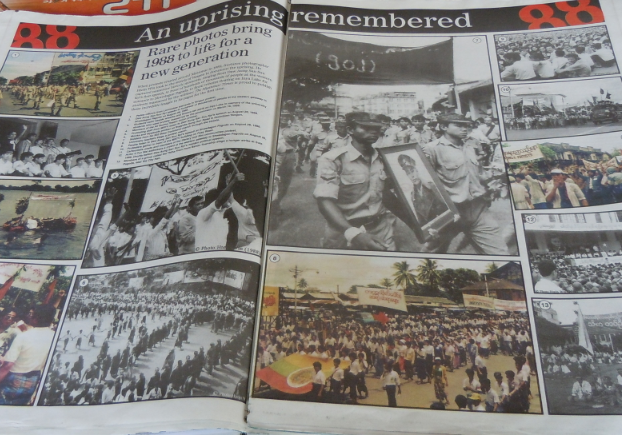Today is a day of mixed feelings for all those involved in Burma’s democracy movement. 8 August marks the 25th anniversary of the democracy uprising in Burma that was brutally crushed by the military regime.
The sweeping electoral victory of the National League for Democracy (NLD) that followed in 1990 was blatantly denied by the military. Many of the NLD’s elected members were locked away in prison under brutal conditions. The leader of the NLD, Daw Aung San Suu Kyi, spent many years under house arrest.
In those dark years, a process of drafting a new constitution was initiated by the military. This was neither an inclusive, open nor participatory process. Proceedings were under strict control of the military. Any criticism of the constitution-making process was criminalised.
From 1988 to 2011, the military ruled in Burma (which it changed to ‘Myanmar’) without a constitution. Since 2011, the regime has allowed for a transition to a more democratic form of government led by a civilian-military government. The 2008 Constitution was a key part of this process. Yet the form of legality it endorses is one that ensures the executive-military remains in firm control of the transition process.
In February 2013, the reformist President Thein Sein announced that a committee would be established in the national parliament to consider amendments to the Constitution. This has created a welcome window of opportunity for constitutional reform. This potential avenue for real change is important for a number of reasons.
First, the 2015 elections are fast approaching. The 2008 Constitution was specifically designed to ensure that Daw Aung San Suu Kyi, as the leader of the democracy movement, could never run as president. The provisions on the requirements of a presidential candidate must be amended so that she is allowed to be nominated as president by the presidential electoral college.
The second is the role of the military. The 2008 Constitution appears to implicitly sanction the military as a fourth branch of government. It allows the military to occupy a quarter of the seats in parliament, and it leaves open the possibility for the military to take over power at any time. The Commander-in-Chief also occupies a position that potentially rivals that of the President, and his powers in a state of emergency are absolute. These privileges amount to abuse of the rule of law and must be abolished. Seats in parliament should not be reserved for the military, and the military must be made subordinate to the executive branch.
The third is the separation of powers. While the Constitution recognises a limited form of the separation of powers, it is clear that the executive retains control over both the judiciary and the legislature. It is vital that a separation of the branches of government is made real. In particular, the judiciary must be granted independence through a transparent appointment process and security of tenure.
Fourth, the ‘f’ word – federalism – is a festering issue that remains to be addressed. At its heart is the relation between the central government and local communities. The key consideration is to give greater powers to the States and Regions to govern their own affairs. At present, the Chief Ministers of the States and Regions are appointed by the President. At the very least, this appointment process must change so that the States and Regions are empowered to independently appoint their own Chief Ministers. An additional step forward would be to empower State and Regional governments to manage their own affairs, without threat of national government interference.
Finally, this amendment process must open up opportunities for future constitutional amendments. The Constitution sets an extremely high benchmark in order to pass amendments. It requires more than 75 per cent of all representatives in the national parliament, as well as more than half the votes at a national referendum. This leaves no doubt that the military controls the current constitutional amendment process, given that it occupies 25 per cent of the seats in parliament. The provision on amending the Constitution must be amended to ensure that this is no longer the case.
The list of potential amendments could on: real guarantees for human rights, independence for the Union Election Commission, greater mechanisms for accountability of government action, just to name a few. Yet the above issues would be a real start. These formal and structural reforms to the legal order would then open the way for more substantive changes to take place.
The 8888 anniversary is a time to reflect on 25 years of a heroic and prolonged struggle for democracy, one that continues today. But it must also be a time to look forward, and to see this opening for constitutional amendment as the key to a genuine and fair political contest in the 2015 elections.
Dr Melissa Crouch is a Postdoctoral Fellow at the Law Faculty, the National University of Singapore and an Associate of the Centre for Indonesian Law and Islam, the University of Melbourne. She is also a member of the Myanmar Constitutional Democracy Working Group.
 Facebook
Facebook  Twitter
Twitter  Soundcloud
Soundcloud  Youtube
Youtube  Rss
Rss 